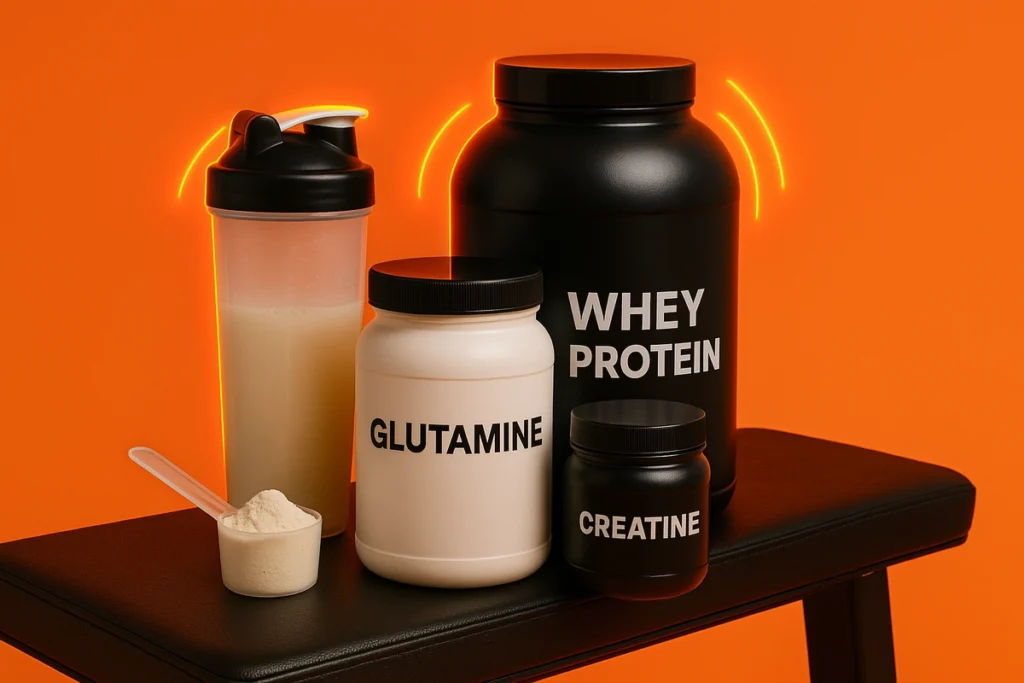As a fitness coach and bodybuilder, I’ve experimented with a variety of supplements to optimize recovery, performance, and overall health.
One question I often hear from my clients is: Can I take glutamine on an empty stomach?
I’ve personally tested this, researched the science, and coached athletes using glutamine in different ways.
In this article, I’ll break it all down for you—including my experience, expert-backed facts, and the best ways to use glutamine for your fitness goals.
Table of contents
The Short Answer

Yes, you can take glutamine on an empty stomach. For general health benefits (gut health, immune support, mental focus), this might be an effective strategy.
However, for muscle recovery and bodybuilding, taking it post-workout and before bed is likely more beneficial.
So before you start taking glutamine first thing in the morning, let’s explore whether it’s the right approach for your needs.
My Personal Experiment: Taking Glutamine on an Empty Stomach

To give an honest, experience-based answer, I ran a 30-day self-experiment where I took glutamine first thing in the morning on an empty stomach.
🚨 Results? I didn’t notice any significant changes in muscle recovery, strength, or performance. My soreness and energy levels felt about the same as before.
However, after diving into research, I found that morning glutamine supplementation may still offer general health benefits, including:
- Improved gut health – Supports the intestinal lining and may help with bloating and digestion (Cleveland Clinic)
- Stronger immune system – Helps the body recover from stress, illness, or intense training (WebMD)
- Enhanced insulin sensitivity – Could support blood sugar regulation (University of Michigan Health)
- Increased mental focus & energy – Some users report cognitive benefits
So if gut health and focus are your priority, glutamine on an empty stomach may be helpful. But for muscle recovery, I found other timing strategies worked better.
Best Time to Take Glutamine for Muscle Growth & Recovery

Over my years of coaching and personal training, I’ve seen the best muscle recovery results when glutamine is taken at these key times:
- Post-Workout (Most Effective for Recovery)
- Before Bed (Overnight Muscle Repair & Growth)
1. Post-Workout (Most Effective for Recovery)
- Your muscles are depleted after training, and glutamine helps with faster repair and soreness reduction.
- I take 5 grams immediately after my workout with my protein shake.
2. Before Bed (Overnight Muscle Repair & Growth)
- Your body repairs itself while you sleep, and glutamine supports nighttime recovery.
- I take 5 grams before bed, and I’ve noticed less soreness the next day.
A Quick Note for Beginners
- If you’re eating enough protein-rich foods (chicken, eggs, dairy, fish), you may not need a glutamine supplement.
- If you’re in a caloric deficit or cutting phase, supplementing can help preserve muscle and speed up recovery.
Real-World Coaching Stories

📌 2020 – A Competitive Athlete’s Recovery Plan
In 2020, I coached a competitive bodybuilder preparing for a show. His biggest struggle? Extreme soreness and recovery issues during his deep cutting phase.
- My recommendation: 5g glutamine post-workout & 5g before bed.
- Results: After 2 weeks, he reported less soreness, better sleep, and improved training frequency.
📌 2021 – A Busy Professional Struggling with Fatigue
One of my clients (who wasn’t a hardcore lifter) wanted better digestion and focus at work. Since his training was moderate, I had him take 5g glutamine first thing in the morning on an empty stomach.
Results: Within a few weeks, he noticed less bloating and improved mental clarity. This proved to me that morning glutamine is better for general health rather than muscle recovery.
Possible Side Effects of Glutamine

Glutamine is generally safe, but like any supplement, some people may experience mild side effects.
🚨 Potential Side Effects Include:
- Mild Stomach Discomfort – Bloating, nausea, or minor stomach pain (especially when taken in high doses or on an empty stomach).
- Digestive Issues – Some users report gas, diarrhea, or constipation.
- Possible Headaches or Dizziness – Uncommon, but has been reported by some users.
- Allergic Reactions (Rare) – If you feel itching, swelling, or a rash, stop taking it and consult a doctor.
- Kidney or Liver Concerns – If you have pre-existing kidney or liver conditions, talk to a doctor before taking glutamine. (University of Michigan Health)
How to Reduce Side Effects:
- Start with a lower dose (3-5g) and see how your body reacts.
- If you feel bloating, try taking glutamine with food instead of on an empty stomach.
Should You Take Glutamine?

As a fitness coach and someone who has used glutamine for years, here’s my science-backed, experience-based recommendation:
- For faster recovery & muscle growth → Take 5-10g post-workout & before bed.
- For cutting & muscle retention → Combine glutamine + BCAAs to prevent muscle breakdown.
- For gut health & focus → Try 5g glutamine in the morning on an empty stomach.
- For general wellness → You may not need glutamine if you get enough protein from food.
Best Supplement Stacks with Glutamine

Through coaching and personal experience, I’ve found glutamine works even better when stacked with other supplements:
- For muscle retention in a cut: Glutamine + BCAAs + Whey Protein
- For fast recovery after intense training: Glutamine + Creatine + Electrolytes
- For focus & gut health: Glutamine + Probiotics + Omega-3
Final Thoughts

- ✔️ Yes, you can take glutamine on an empty stomach, and it may help with gut health, immunity, and energy.
- ❌ But for muscle recovery and growth, taking it post-workout and before bed is FAR more effective.
- My personal go-to: 5g post-workout + 5g before bed (works like a charm!).
- Want better digestion or mental focus? Try it in the morning on an empty stomach.
- Not sure if you need it? If you’re training hard and struggling with recovery, it’s worth testing!
This article combines my coaching experience with trusted scientific research to provide evidence-based, practical strategies for improving digestion, focus, and overall well-being.
At the end of the day, supplements aren’t magic, but when used correctly, they can help you train harder, recover faster, and perform better.
Now Over to You!
Have you tried taking glutamine on an empty stomach? What’s your experience? Drop a comment below—I’d love to hear your thoughts!
Resources for Enhancing Digestion and Focus with Glutamine
To provide further insights into the benefits of glutamine supplementation, particularly concerning digestion and cognitive function, consider the following reputable sources:
- Glutamine’s Role in Gut Health – This article from the Canadian Digestive Health Foundation discusses how glutamine supports digestive health, strengthens the immune system, and becomes increasingly important as we age.
- Comprehensive Overview of Glutamine Benefits – Healthline provides an in-depth look at glutamine, highlighting its importance in immune support and intestinal health, and discussing its presence in various foods and supplements.
- Glutamine’s Impact on Gut Microbiota and Disease – This systematic review from the National Library of Medicine explores glutamine’s role in the complex interaction between gut microbiota and disease, offering insights into its potential therapeutic applications.
These resources offer valuable information on how glutamine supplementation can enhance digestive health and cognitive focus, supporting your client’s wellness journey.
🩺 Disclaimer: This article is for informational purposes only and not medical advice. Always consult with a healthcare provider before starting any supplement.



Leave a Reply